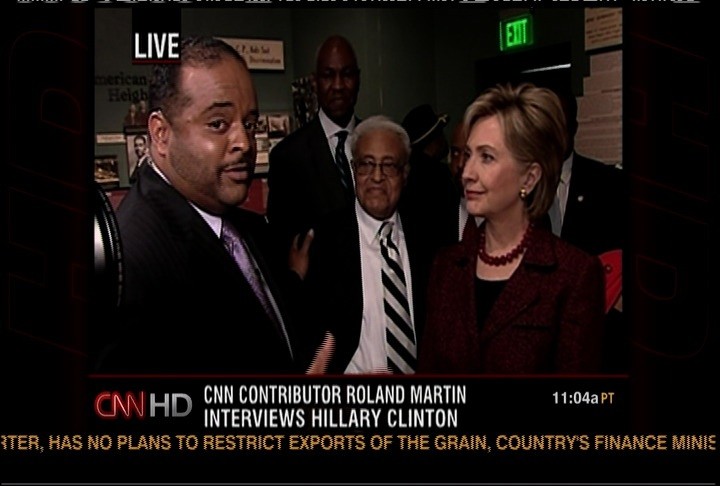Transcript: CNN Contributor Roland Martin Interviews Sen. Hillary Rodham Clinton At Civil Rights Museum In Memphis, Tenn.

CNN’s Roland Martin talks to Sen. Hillary Rodham Clinton about top issues on Americans mind today are the economy and the war in
ROLAND MARTIN, CNN CONTRIBUTOR: Hey, T.J. Thanks a lot.
We are here with Senator Clinton, also Ben Hooks, who was executive director for a long time of the NAACP, a number of others — the mayor
of
Senator Clinton, a critical issue, and that is, the last year of his life, Dr. King was focused on the war in
What must Americans do to advance the issues that he was focused on, as opposed to only looking back in terms of retrospect, what he was doing 40 years ago?
SEN. HILLARY RODHAM CLINTON (D-NY), PRESIDENTIAL CANDIDATE: Well, Roland, that’s what I was speaking about earlier today. The best way to honor and remember Dr. King’s legacy is to fulfill it.
And he was here in
Today I announced that I would have a high-level person of cabinet status who would be devoted to doing everything we could to do through the government to alleviate, prevent and end poverty. It is way past time.
I went to the Poor People’s March on
So, we do have work to do. And ending the war in
MARTIN: Let’s deal with education. Dr. King, a learned man, went to college at a very early age. I was watching a story last night, a young man in
our school books home.
And so, do you think most Americans truly understand in inner cities we have kids who cannot bring school books home, who are not getting an equal and affordable high education that we see in the suburbs?
I believe that the role of the federal government is not to impose an unfunded mandate like No Child Left Behind willy-nilly on everybody. I don’t think that’s what we need to be doing.
We need to be targeting our resources to help schools like here in
We need to have preschool education so that every child gets a chance to be successful in school. And we’ve got to make college affordable.
You know, when Dr. King went to college, when I went to college, it was affordable compared to what the average income was. And we have a lot of direct aid and really low interest loans. Much of that has been lost in this ideological frenzy to let the market work its will on people, whether or not they’re going to be left in the dust.
So I feel very strongly that when it comes to public education, it is an incredibly important commitment of the federal government. We have to do it right, and I intend to.
MARTIN: Last question and that is a conversation with
There’s something I noticed, and that is many conservative talk show hosts talk about Dr. King, content of the character, but they’re not here. Isn’t that part of the issue as well, that the conversation on race typically is being discussed among black radio show hosts? Shouldn’t there be a greater conversation where all Americans are talking about it to advance the issue? Even Condoleezza Rice said it was a birth defect, the issue of race in
We’ve had conversations. They’ve been behind closed doors, they’ve been in churches, and they’ve been in the halls of Congress. But we haven’t done everything we need to do.
Now, we’ve made progress. Let’s not be unmindful of that. But we haven’t made the kind of progress that locks in that dream and legacy.
So we do have a lot to do. And I am proposing solutions that I think will lift all Americans. But they will disproportionately affect and help African-Americans who have been all too often left behind.
And so my view about the conversation is, yes, everyone needs to be involved in it, we need to be educated, we need to challenge one another. It has to be a provocative conversation if it’s going to lead
to any results.
But then we’ve got to come together, as we are here in
You know, Dr. King didn’t just come and speak to the sanitation workers, he walked with them. He agitated. He said, give them their rights.
And that’s what we have to do. We have to translate this conversation into positive results for
MARTIN: Bill Schneider just talked to us. He said in
So the Democratic Party is going to have to come to grips with whether or not we want to be like the Republicans and disenfranchise people, or whether we will stay true to the voting rights record of this party. You know, here, as we are commemorating Dr. King’s 40th death anniversary, let’s remember that the Voting Rights Act lifted all Americans. It gave everyone the right to participate.
Let’s not begin to pull back from that. We’ve got to work this out.
MARTIN: Senator Clinton, I certainly appreciate it. Thanks a lot.
MARTIN: Thank you very much.




